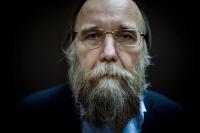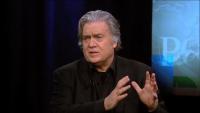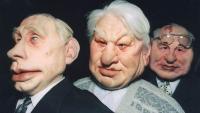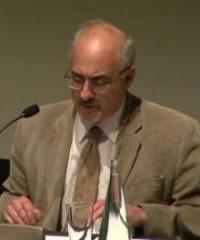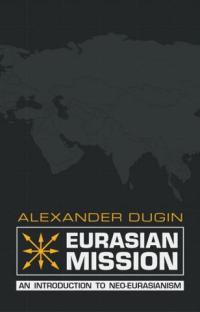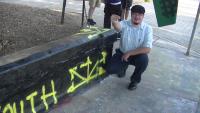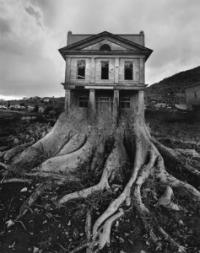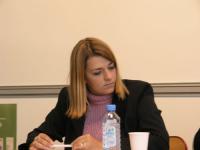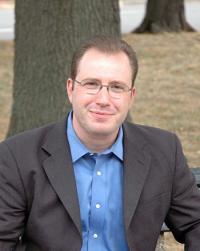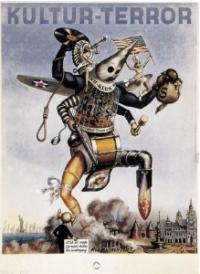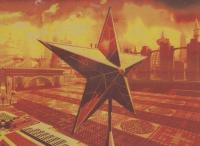polemics1
If Mr. Dugin is demonized by the ”Washington Post”, that means he's right
“Let them call you racists. Let them call you xenophobes. Let them call you nativists”. In other words, Bannon's call for European patriots is not to be intimidated by the pernicious accusations of corporate media. Well, denigration and demonization of the opponents of international mafia like Soros network continues. And this is a sure sign that European populists are on the right track. This shows that Dugin and his followers everywhere are not just right, but also successful.
The Return of the Great Times
I agree with Brandon W. Hawk in the essence. I love the Middle Ages and I hate Modernity. For me, the Enlightenment is totally wrong, and Modern science and the broader Modern “scientific” world vision is based on a lie. I believe in God, Angels and the Holy Spirit, not in Descartes, F. Bacon, or Einstein. I think Plato and Aristotle were absolutely right and their atomist detractors absolutely wrong. I am sure that the Church Fathers are bearers of absolute truth and that Modern philosophy is the radiation of the mind of the fallen Angel – Satan. I am sure that the Apocalypse is near, and I regard liberalism and globalization as clear signs of the approaching Antichrist and End Times. I am a Traditionalist and follower of the Russian Slavophiles, of Dostoevsky, of Soloviev, of various Russian religious philosophers and monarchists. I appreciate very much the ideas of René Guénon and Julius Evola. I am absolutely in favor of Antiquity and the Middle Ages and absolutely against Modernity in all its forms. So I have an anti-Modern and anti-Western (when the Modernity and the West mean the same) worldview, and I see Modernity as the catastrophe and decline of the West. Philosophically, I agree with Heidegger that Modernity is based on the Oblivion of Being, and I call on thinking people to awaken to the new discovery of Being. I regard Artificial Intelligence as the final personification of das Man (or Gestell) and I consider it to be the Antichrist, or one of his heads.
WHY FAR-RIGHT NATIONALISTS LIKE STEVE BANNON HAVE EMBRACED A RUSSIAN IDEOLOGUE
Bannon’s return should raise concerns. It became clear during his time in the Trump campaign and then the administration that the former head of Breitbart was a key player in the mainstreaming of the alt-right in the United States. But Bannon’s reemergence is tied to the global spread of the far right in the United States and Europe. And Bannon is using a racist version of the history of the Middle Ages to justify and legitimize his vision for nationalist imperialism.
Anti-Communism And Anti-Fascism Are Tools Of Capitalism
In the post-Soviet period, communism went through several stages in our society. First, after the fall of the USSR, there were Marxist circles that still had inertia, which did not surrender, believing that the catastrophe was temporary. In this passive attitude, an indecisive and conformist nostalgia became a form of suicide and led to their disappearance. There were also radical communists in the 90’s who tried to get together – among them were passionate people who were not significant during the USSR itself, but in the 90’s they turned out to be honest people with integrity – but gradually they also ceased to really be. For a while in Russia, we were without communists.
IT’S TIME FOR SUPER-PUTIN
Putin is the compromise. If he is gone, there will be no compromise. It is clear that the elite is so resourceful and mean that it will try to adapt to another system, but this does not fundamentally cancel the fact that Putin cannot decisively influence the future. In a sense, he has already influenced it. And this influence is very positive: he showed that the 90s have an alternative, that it lies somewhere in the plane of patriotism (Second Chechen, Munich speech, “Our Crimea”, etc.), and this, in fact, is a grandiose accomplishment. But at the same time, Putin did not give the form and institutionalization of this patriotism, did not change the foundations of the state laid just in the 90s, did not carry out the rotation of the elites, ignored the popular demand for social justice. The established regime in the eyes of the people as a whole is much better than it was in the 90s (hence its legitimacy), but definitely worse than what is required. While Putin is in place, his merits cover the shortcomings. Once he leaves, a delicate and rather unnatural balance will collapse. By the way, Surkov is not right about de Gaulle: his legitimacy, relying on his role in World War II and the Resistance, lasted only until the early 70s, when he remained in power, and collapsed during the events of 1968, which abolished Gollist conservatism and established new socialist paradigm. Later, de Gaulle remained only nostalgia and simulacra.
Who is Aleksandr Dugin?
Aleksandr Dugin has come to public attention as “Putin’s Brain,” as Foreign Affairs memorably dubbed him – that is, as the ideological mastermind behind Russia’s moves towards reasserting imperial ambitions, notably with respect to Ukraine. Is this accurate, or is it just media hype? The truth is that it’s extremely difficult to judge with confidence exactly to what extent Vladimir Putin’s more aggressive policies towards, for instance, Ukraine reflect Dugin’s influence (or supposed influence) as an omnipresent publicist and behind-the-curtain advisor to aspiring czars. (The suspicion easily arises that Putin uses Dugin – lets him rant on state TV – without himself buying into the crazy worldview.) But whether Dugin really is influencing Russian policy or is simply the object of excessive hype, either way intellectuals as well as ordinary citizens in the West need to be aware of him, lest they be taken in by his pretensions as a theorist and his claimed interest in civilizational dialogue and pluralism, which functions as a rhetorical cloak. Either way, he’s dangerous.
Thoughts on Dugin's "Eurasian Mission"
Along with the more geopolitical aspects, the Fourth Political Theory lies at the heart of Eurasianism, and constitutes its philosophical core. Drawing its roots from France's New Right, the Third Way, the German Conservative Revolution, and thinkers as diverse as Heidegger, Boaz, Evola, and de Benoist, the Fourth Political Theory could be summed up by what Alain Soral calls "la gauche du travail et la droite des valeurs" ("the worker’s left and the moral right"). It is important to note that, just like Alain Soral, Dugin rejects ethnocentrism. The Fourth Political Theory rejects not only liberalism (capitalism), but also communism (socialism) and fascism, preferring a blend of the two non-capitalistic systems in order to prevent each one’s particular shortcomings.
Even though it believes in multipolarity, Russia is central to Eurasianism, as is the goal of creating a "European Space," encompassing both Europe and Russia. The objective is clearly to shift the balance of global power from Washington to Moscow, although Dugin denies this in an interview with Arktos published at the end of the book.
It’s Not About Dugin
Whatever you think of Dugin, he’s largely beside the point. What’s happening is far greater than Dugin, and it’s far too great for any one man, even a man as ambitious and capable as Dugin, to master. Much the same way that Thomas Edison deserves credit for inventing the light bulb after having laboriously tested hundreds of filaments on his way to the right material, Alexander Dugin deserves credit for inventing the phenomenon of Tradition as a global ideology in opposition to the Western elites. He clouds his works up with hundreds upon hundreds of other ideas, many of which are useless or irrelevant for ourselves, but this one idea of his is the defining idea which will define the geopolitics of the coming century.
Alexander Dugin’s 4 Political Theory is for the Russian Empire, not for European Ethno-Nationalists
Only a rare few in the alternative right knew Alexander Dugin before the publication and translation of his book, The Fourth Political Theory, in 2012. Suddenly, the contents of this book became the subject of lively discussion and he was hailed as “arguably the most prominent New Right thinker in the world.” With the exception of Michael O’Meara at Counter Currents, most of the reviews were very positive or at least sympathetic. After reading reviews, interviews, blogs, articles, and listening to some video lectures by Dugin, I decided to read The Fourth Political Theory (FPT).
Through the first pages, I was fairly impressed by Dugin’s laconic treatment of the way liberalism had created the normative conditions for a humanity predisposed toward a world government in its “glorification of total freedom and the independence of the individual from any kind of limits, including reason, identity (social, ethnic, or even gender), discipline, and so on” (18). With the “liberation” of man from any necessary, pre-ordained membership in any community or identity, and the universal morality of human rights widely accepted, few obstacles now stood in the way of a totalitarian global market.
The Third Political Theory
According to Dugin, National Socialist Germany and Fascist Italy were not just militarily, but ideologically defeated in the Second European Civil War (1939–45)—victims of “‘homicide’, or perhaps ‘suicide’.” Thereafter, these two national anti-liberal ideologies allegedly “overcome by history” ceased to address the great challenges facing European man. Then, with Communism’s fall in 1989/91, the second major anti-liberal “theory” opposing the Judeo-financial forces of Anglo-American liberalism collapsed. Today’s anti-liberal struggle, Dugin concludes, requires an ideology that has not “been destroyed and disappeared off the face of the earth.”
There is nothing in The Fourth Political Theory likely to please the Correctorate—which is, perhaps, reason for reading it. Nevertheless, Dugin’s effort to develop a compelling new “theory” appropriate to the global anti-system resistance must be judged (I’ll not be the first to say) a “failure”—an interesting failure, admittedly, but one also constituting a possible snare for the anti-system opposition, especially in its misleading treatment of 3PT and its implications for the anti-system resistance.
Aleksadr Dugin: A Russian Version of the European Radical Right?
In studying contemporary Russian Eurasianism—both as a doctrine and as a political movement—one constantly comes across Aleksandr Dugin. One of the main reasons that he is relevant to any such study is the quasi-monopoly he exercises over a certain part of the current Russian ideological spectrum. This spectrum includes a plethora of right-wing groupuscules that produce an enormous number of books and an impressive quantity of low-circulation newspapers, but are not readily distinguishable from each other and display little theoretical consistency or sophistication. Dugin is the only major theoretician among this Russian radical right. He is simultaneously on the fringe and at the center of the Russian nationalist phenomenon. He provides theoretical inspiration to many currents and disseminates precepts that can be recycled at different levels. Above all he is striving to cover every niche on the current ideological marketplace. He proceeds from the assumption that Russian society and Russia’s political establishment are in search of a new ideology: he therefore owes it to himself to exercise his influence over all the ideological options and their possible formulations.
SLOUCHING TOWARD EURASIA?
Since Vladimir Putin's assumption of the Russian presidency in December of 1999, Moscow's foreign policy has changed course. The norm is no longer President Yel'tsin's sometimes halting embrace of Europe and the West, which persisted in spite of pressures both from hard-liners within his own government (such as Foreign Minister -- and later Prime Minister -- Yevgeny Primakov) and from the secret police and intelligence organs. Instead, under Putin's direction, Russia's manipulation of foreign affairs -- despite fluctuations in tone -- generally appears to be more aggressive and "geopolitical," raising worries about renewed imperial aspirations on the part of the Kremlin.
The post-1999 foreign policy approach is based on an ideological infrastructure. Long relegated to ultranationalists and a handful of "new right" thinkers, the previously obscure doctrine of Eurasianism has emerged as a major force in Russian politics. It is noteworthy not only for its appeal as the basis for a renewed quest for national greatness, but also for the degree to which its tenets appear to have begun to animate many of President Putin's international maneuvers.
Dugin’s America
Alexander Dugin is a popular, well-connected, and academically respected professor at Moscow State University. Unlike his North American and Western European counterparts, his ideas are not censored by Russia’s mainstream media, and he more or less enjoys the favor of Putin’s Russian government. While he’s indubitably the most prominent New Right thinker in Russia, his domestic influence and his ambitious efforts to build international partnerships and relationships have made him arguably the most prominent New Right thinker in the world.
His recently written and translated book, The Fourth Political Theory is a critical milestone in the global development of a New Right school of thought. In it, he strives to speak to a truly global audience, though his parochial biases and perspectives are a regular distraction from that goal. He strives to speak above and beyond modern liberal paradigms and values, but there’s a fair share of self-censorship, cleverness, and . . . Realpolitik . . . to wade through.
Dugin Gets in the Ring. Whither the Fourth Political Theory?
The Fourth Political Theory is a book that is clearly not short on ambition. I haven’t actually read it, but I already know more or less what is in it from past writings by its author Professor Alexander Dugin, as well as the lengthy video presentation he gave of his ideas at the Identitarian Ideas conference held earlier this year in Stockholm.
Dugin believes there have been three great ideologies in modern history – Liberalism, Communism, and Fascism/National Socialism – and that we are now seeing the formation of the Fourth, which is still waiting to be properly christened and so is known by an ordinal. In the footsteps of Locke, Marx, and Mussolini, we now have Dugin.
I greatly respect and like Dugin. With his Tolstoyan beard and aura of an old church father, he’s a personable and reassuring presence. But I also know how the academic world works, and how it finds all sorts of clever ways to serve different masters, and Professor Dugin is certainly well-connected to a lot of people in the Russian establishment. Is it a coincidence that his ideas support the existence of the Russian Orthodox Church or the multi-ethnic imperialism that is the unavoidable basis for a strong Russian state?
LETTER TO ALEKSANDR DUGIN
Dear Aleksandr,
As a thinker and and author on philosophy, science and religion, theo-politics, geo-politics and financial geo-economics, and having great respect for the breadth an depth your work and vision, I am writing to you now – and through you, to the International Eurasian Movement as a whole – with a feeling of great urgency.
My aim is not only to let you know about The National People’s Party in the U.K., but above all to bring your attention through it to what I see as a central and urgent question - one which I believe is absolutely vital for all Eurasianists to recognise if your vision is to be realised.
The question concerns the changed nature of money and currency and in particular the right of both nations and federations of nations to create and issue their own currency - without borrowing from commercial and international banks. This is the sovereign economic right that Abraham Lincoln fought form by issuing Greenbacks as a sovereign currency – a major cause of the war against the colonists launched by King George and funded by international bankers.


